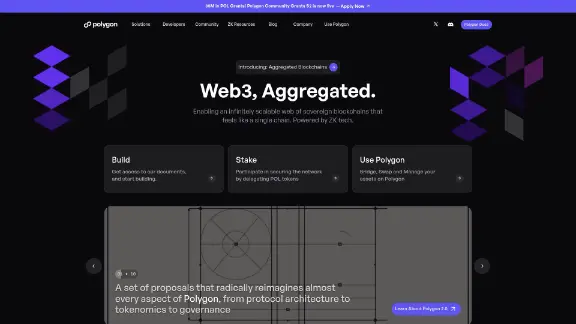Polygon PoS Bridged WETH (Polygon POS) (WETH)
Polygon, formerly known as Matic Network, is a leading platform in the realm of blockchain scalability. It aims to address some of the most pressing challenges facing the Ethereum blockchain, such as high transaction fees and slow transaction speeds, by providing Layer 2 scaling solutions.
History of Polygon
Polygon was founded in 2017 by a team of developers: Jaynti Kanani, Sandeep Nailwal, Anurag Arjun, and Mihailo Bjelic. Initially launched as Matic Network, the project underwent a rebranding in February 2021 to become Polygon. This rebranding was not merely a change of name but also a broadening of the project's scope to encompass a wider range of scaling solutions beyond its original plasma chains.

| Ticker | WETH |
| Category | Polygon Ecosystem |
| Website | https://polygon.technology/ |
| Contract Addresses | |
|---|---|
| polygon-pos | 0x7c...19 Copied! Copied! |
Evolution from Matic Network to Polygon
The transition from Matic Network to Polygon marked a significant expansion in the project's vision. While Matic Network focused on providing a scalable and efficient Layer 2 solution using sidechains, Polygon introduced a modular and flexible framework to create and connect multiple scaling solutions. This includes a variety of technologies such as zk-rollups, optimistic rollups, and standalone chains.
How Polygon works
Polygon provides a framework that transforms Ethereum into a full-fledged multi-chain system. It achieves this by offering tools and technologies that facilitate the creation of scalable decentralized applications (dApps) and smart contracts.
Architecture of Polygon
Polygon's architecture is designed to be robust and highly interoperable with the Ethereum blockchain. It consists of several components:
The Polygon SDK
The Polygon SDK is a modular and flexible framework that allows developers to build and deploy their own Ethereum-compatible blockchain networks. This SDK supports multiple scaling solutions and can be tailored to suit the specific needs of different applications.
The security layer
Polygon offers a security model that can be adapted according to the needs of different projects. This includes a "Security as a Service" model, where projects can opt for security provided by Ethereum or rely on their own validator set.
The polygon networks
Polygon supports various types of networks, including standalone chains and secured chains. Standalone chains are independent networks with their own consensus models, while secured chains leverage Ethereum's security through methods such as zk-rollups and optimistic rollups.
Features of Polygon
Polygon is characterized by several key features that enhance the performance and usability of blockchain networks.
Scalability
One of the primary objectives of Polygon is to improve scalability. By employing Layer 2 solutions, Polygon significantly reduces the load on the Ethereum main chain, thereby increasing the number of transactions that can be processed per second.
Interoperability
Polygon enables seamless communication and interaction between different blockchain networks. This interoperability is crucial for the development of a diverse ecosystem where dApps can interact with other services and platforms without compatibility issues.
Customizability
Polygon provides developers with the flexibility to customize their blockchain networks according to their specific requirements. This includes choosing the appropriate consensus mechanism, security model, and scaling solution.
Use cases of Polygon
Polygon's versatile architecture supports a wide range of applications across various industries.
Decentralized finance (DeFi)
Polygon has become a popular choice for DeFi applications due to its ability to handle high transaction volumes with low fees. Many DeFi platforms and protocols have integrated with Polygon to enhance their scalability and user experience.
Non-fungible tokens (NFTs)
The NFT market has also benefited from Polygon's scalability solutions. By reducing gas fees and increasing transaction speeds, Polygon makes it feasible to mint, buy, and sell NFTs efficiently.
Gaming
The gaming industry has leveraged Polygon's capabilities to create blockchain-based games that require fast and inexpensive transactions. This has led to the development of new gaming experiences that integrate digital assets and collectibles.
